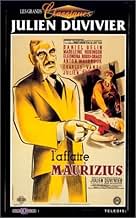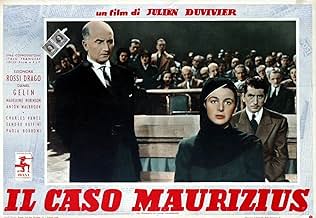Etzel Andergast, fils d'un procureur, découvre que son père a condamné un homme sur de simples présomptions. Le jeune homme, épris de justice, met un point d'honneur à remonter aux sources d... Tout lireEtzel Andergast, fils d'un procureur, découvre que son père a condamné un homme sur de simples présomptions. Le jeune homme, épris de justice, met un point d'honneur à remonter aux sources de l'affaire pour découvrir la vérité.Etzel Andergast, fils d'un procureur, découvre que son père a condamné un homme sur de simples présomptions. Le jeune homme, épris de justice, met un point d'honneur à remonter aux sources de l'affaire pour découvrir la vérité.
- Réalisation
- Scénario
- Casting principal
- Récompenses
- 1 victoire au total
Eleonora Rossi Drago
- Anna Jahn
- (as Eleonara Rossi-Drago)
Berthe Bovy
- La grand-mère
- (as Berthe Bovy de la Comédie Française)
Denis d'Inès
- Pierre-Paul Maurizius
- (as Denis D'Ines de la Comédie Française)
Palau
- Le conseiller
- (as Pierre Palau)
Avis à la une
A chance remark by a teacher leads Jacques Chabassol to investigate the case that brought his father, Charles Vanel, to prominence twenty years earlier.
It's another strong movie from Julien Duvivier in which he explores what is now fairly full blown film noir, in a world filled with femmes fatales trapped by men's lusts, prisons in which only the shadows of bars can be seen,bourgeoise Swiss justice a matter of francs and centimes, and the the only way out of prison for Daniel Gélin after eighteen years for a murder he may not have committed...
If it's not film noir, it's very dark magical realism about how there is no repairing the past. With strong and outrageous performances by Madeleine Robinson, and a sometimes heavily bearded Anton Walbrook.
It's another strong movie from Julien Duvivier in which he explores what is now fairly full blown film noir, in a world filled with femmes fatales trapped by men's lusts, prisons in which only the shadows of bars can be seen,bourgeoise Swiss justice a matter of francs and centimes, and the the only way out of prison for Daniel Gélin after eighteen years for a murder he may not have committed...
If it's not film noir, it's very dark magical realism about how there is no repairing the past. With strong and outrageous performances by Madeleine Robinson, and a sometimes heavily bearded Anton Walbrook.
This French film, L'AFFAIRE MAURIZIUS, is listed on IMDb as ON TRIAL, despite the fact that I believe that only the new French Blu-Ray with the French title has ever been distributed in the English-speaking world. Amazon lists it as ON TRIAL, but it is the same French disc bearing the French title, which in its newly restored state has had English subtitles added. Julien Duvivier wrote the screenplay and directed this film. He is one of the finest French directors, and this is one of his finest films. It has been restored as part of a series of French classics being revived on Blu-Ray, about half of which have had English subtitles added. The film is based upon a novel by the Austrian Jewish author Jacob Wassermann (1873-1934) entitled DER FALL MAURIZIUS (1928), published in English in 1930 as THE MAURIZIUS CASE, and also published in France in 1930, in two volumes, as L'AFFAIRE MAURIZIUS. It is the first novel of a trilogy, the second novel being ETZEL ANDERGAST (1931), published in England as ETZEL ANDERGAST (1932) and in America as DR. KERKHOVEN (also 1932). The third volume was Joseph KERKHOVENS DRITTE EXISTENZ (1934), published in English as KERKHOVEN'S THIRD EXISTENCE (1934). By that time, Wassermann was dead, having died of heart failure on January 1. The trilogy was his last literary work. He is best known internationally for having written CASPAR HAUSER (1908), which was apparently the basis for the film THE ENIGMA OF KASPAR HAUSER by Werner Herzog in 1974 (with script by Herzog), though without Wassermann being credited. DER FALL MAURIZIUS was also made into mini-series twice. The first was made in 1961 in Italy. (Few details are available concerning this. Virna Lisi appeared in it.) The second was in five episodes on German television in 1981. Wassermann's books were all banned and burnt by the Nazis. I must be one of the few people who has read all three novels. I was therefore very eager to see what Duvivier could do with THE MAURIZIUS CASE, when his film was recently released in restored condition. The result is perfectly spectacular. The original novel was extremely lengthy, and rather tedious, over-loaded with case evidence and heavily over-written, so that it was something of a task to read it. But Duvivier saw the cinematic possibilities and with a particular genius managed to extract the essence and make a film far more powerful than the book itself. Duvivier was in top form, and every line of dialogue, every framed shot, every bit of atmosphere, every bit of editing, contributed to a work so refined that it could constitute a marvellous specimen for a master-class in film-making. The film is set in Bern, Switzerland, and shot there on location, to great effect. The original novel was set in Vienna. The film's hero is Etzel Andergast, the 16 year-old son of Procureur Andergast (in the novel, Freiherr, i.e., Baron, Andergast, Attorney General). Eighteen years earlier, the father had been responsible for sending a man named Leonard Maurizius to prison for murdering his wife. Young Etzel meets a strange old man who presents a petition to this father, and when his father is out, he reads it. It is a petition on behalf of his son, the imprisoned Maurizius. Etzel can see that there are serious defects in the case. A witness claimed to see Maurizius shoot his wife as he approached the door of his house and she came out towards him, but in fact she had been shot in the back. All such inconvenient evidence had been swept aside by Etzel's father in his desire to win a sensational case and make his way in his career. Etzel cannot tolerate this, and begins to investigate personally. This leads to immense complications and conflicts, and the true story slowly emerges. All the lies are exposed, the passions revealed, the secret history of a murder made clear. It is an extremely powerful story. The acting is magnificent, and the script and direction are utterly astounding. This is a real classic.
Even the most enthusiastic devotee of the prolific Julien Duvivier would probably concede that his post 1930's films are a mixed bag. Whereas 'Panique' in 1946 and 'Voici les temps des assassins' ten years later are undisputed masterpieces the others are those of a 'craftsman'.
The theme of 'L'Affaire Maurizius' is injustice.
Thanks to the efforts of his crusading, idealistic son, Charles Vanel as Wolf Andergast is forced to review an eighteen year old case in which as a deputy prosecutor he successfully condemned a man to Life imprisonment.The case turns out to be not quite as clear-cut as it seemed.
Vanel is as always superb. Daniel Gelin arouses our sympathy as the wrongfully accused man; Madeleine Robinson does well in a thankless part as a jealous wife and Anton Walbrook is outrageous but mesmerising as a seedy, drunken voluptuary. There is an excellent turn by Jaques Varennes as the examining magistrate. The only weak link is the Anna of Eleanora Rossi-Drago. Her character is so colourless and sexless that one cannot imagine her causing the havoc that she does.
This is a bizarre, cynical and deeply pessimistic melodrama that will nonetheless keep you absorbed, the ending of which really packs a punch.
10clanciai
This is one of the most complicated murder cases ever screened, the story is overwhelming in complexities, and what seems to be an easy and self-evident beginning, soon winds itself into an inextricable labyrinth, in which everyone is misled to gross mistakes except the one man who knows and maybe is responsible for it all, the mysterious character of Doktor Warschauer, a pathetic remnant of a once brilliant ace of culture, theatre and learning, reduced to a hopeless remorseful drunk, who doesn't care about anything any more but who is the only one who knows the entire truth although he has perjured himself for it, and he prroduces the very weird definition of justice in the most famous scene of the film, when he confides in his young student (learning English from him) in Lucerne with two ballerinas dancing gaily in the background - a typical Julien Duvivier grotesque but ingenious arrangement. Because of one victim, they are all victims in this, and although there might be some hope after all, the hoplelessly desperate face of Mr Maurizius in tears vanishing in the darkness is the final signature of the film. This is perhaps Anton Walbrook's most interesting and prominent performance, seconded well by the totally matter-of-fact and unsentimental Charles Vanel in his most consistently objective role - his poker face conceals any abysses of regrets and hard experience, maybe also of intolerable lessons, but he lets absolutely nothing out. Eleonora Rossi Drago plays the most important female part, and although her part is small, she turns the tables more than once. It's an excruciating labyrinthal odyssey in the hopeless Kafkaesque nightmare of the entrapment of court procedures, (the author Jacob Wassermann of Vienna, 1873-1934, was himself a Jew,) but Julien Duvivier as usual controls everything with the accomplished hand of a perfect master.
Julien Duvivier must be one of the unsung heroes of French cinema; I have now seen 5 or 6 films made by him, and I've liked or loved each and every one of them. "L' Affaire Maurizius", one of his least-known efforts, is an engaging whodunit, with some social commentary added; the flashbacks, and sometimes flashbacks-within-flashbacks, are particularly well-handled. Leonard Maltin gives it two stars, but lists the running time as 70 minutes; my copy ran about 105 minutes, so it's safe to say he saw a very edited-down version. I give mine an easy *** out of 4.
Meilleurs choix
Connectez-vous pour évaluer et suivre la liste de favoris afin de recevoir des recommandations personnalisées
Détails
- Durée1 heure 50 minutes
- Couleur
- Mixage
- Rapport de forme
- 1.37 : 1
Contribuer à cette page
Suggérer une modification ou ajouter du contenu manquant

Lacune principale
By what name was L'affaire Maurizius (1954) officially released in Canada in English?
Répondre






























